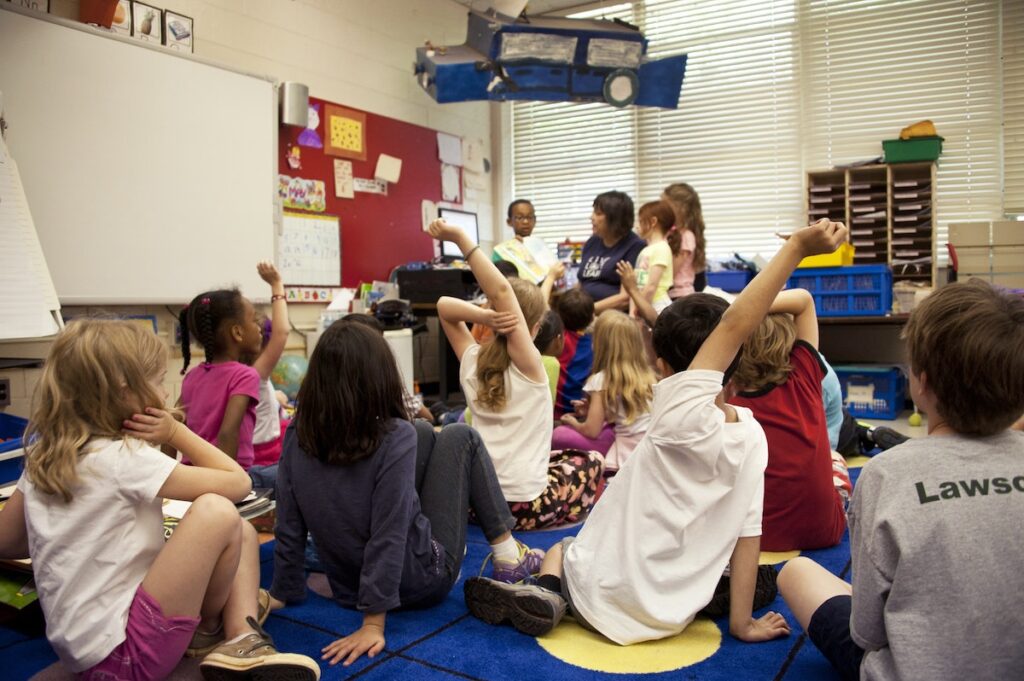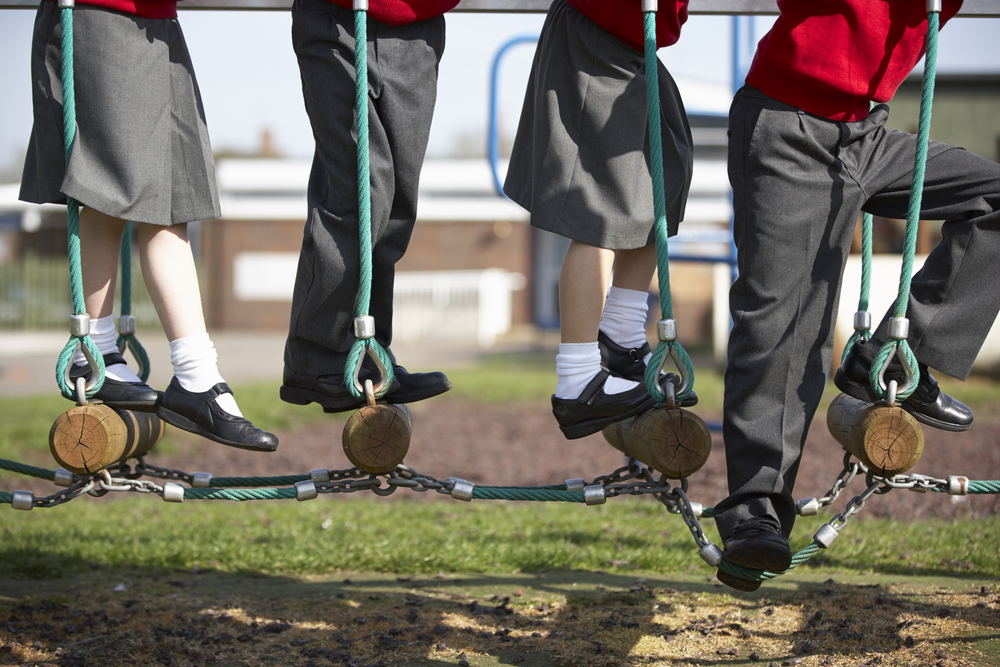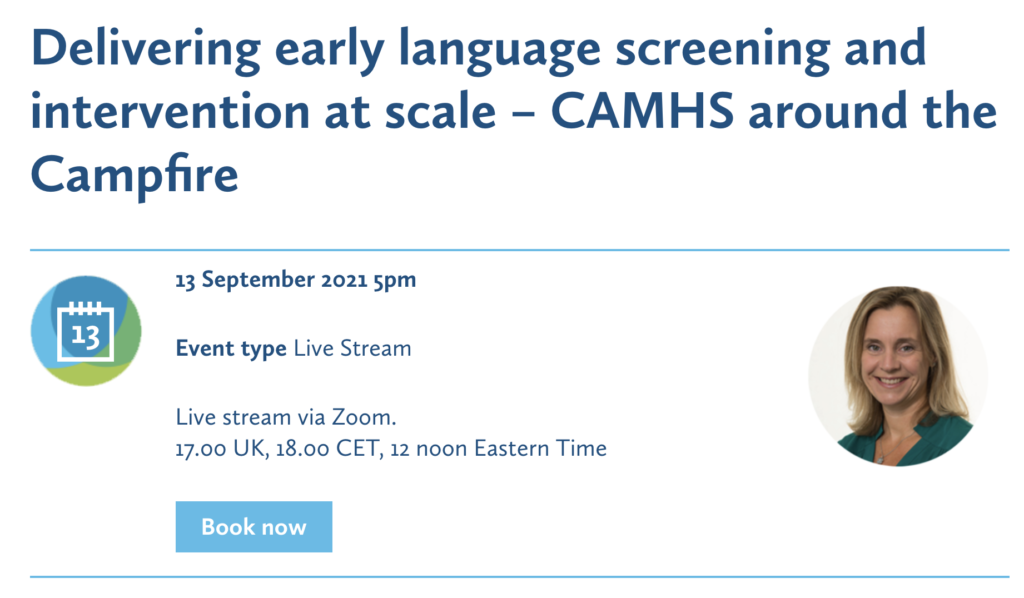
Language difficulties are common amongst children, with wide-ranging and lasting effects. However, evidence from systematic reviews suggests that interventions targeting language skills only have a small effect. The reviews also highlight important methodological limitations and lack of statistical power in previous trials.
So the aim of this study (West et al, 2021), recently published in the Journal of Child Psychology and Psychiatry, and covered today in our blog and #CAMHScampfire webinar, was to carry out a large-scale cluster randomised trial with sufficient power to detect the effects of a school-based language intervention – the Nuffield Early Language Intervention.

This cluster RCT measured the “effectiveness of the Nuffield Early Language Intervention (NELI) programme in ameliorating language difficulties in the first year of school when delivered at scale”.
Methods
The unit of randomisation was a group (cluster) of schools. Randomisation was stratified by school location and the number of reception classes in each school. The trial protocol was pre-registered.
Participants
Children in reception classes (aged 4-5) were eligible, with some participants excluded at this stage where they would be unable to engage with the assessment tools. All children were screened using the LanguageScreen app. The five children with the lowest language scores in each class were recruited to the trial.
The intervention
The Nuffield Early Language Intervention (NELI) is a 20-week programme taught by classroom assistants. It combines 30-minute small-group and 15-minute individual sessions. In this study, classroom assistants were trained and supported by an independent training provider specialising in Speech and Language Therapy (SLT).
The control group was run as a “waiting list” control. These schools operated as normal, but were given a voucher to buy NELI training after the trial.
Outcomes
Outcome measures were gathered by trained SLTs, and directly from children using the LanguageScreen app. Primary outcomes were the Expressive Vocabulary and Recalling Sentences subtests from the Child Evaluation of Language Fundamentals (CELF) Preschool II, and the Renfrew Action Picture Test. Secondary outcomes were gathered from LanguageScreen on expressive vocabulary, receptive vocabulary, sentence repetition and listening comprehension.

Across 193 primary schools, 238 reception classes (children aged 4-5) each recruited the five children with the lowest baseline language scores.
Results
238 reception year classes (children aged 4-5) from 193 different schools were included in the trial. Each class recruited the five children with the lowest baseline scores (see outcomes) yielding 1,173 participants in total.
In all analyses:
- both experimental and control groups showed improvement in language scores
- the experimental group improved more than the control group, consistently across all language scores (Cohen’s d=0.26, 95% CI 0.017 to 0.36 for the primary outcome).
It is notable that d=0.26 corresponds to a “small-to-medium” effect size. This means that about 60% of NELI participants improved language skills more than the average improvement in the control group (Norbury, 2021).
The researchers reported that similar benefits were found amongst children for whom English is a second language.
No adverse events were reported.

This well conducted large trial suggests that the Nuffield Early Language Intervention can provide a small, but potentially educationally meaningful boost to child language.
Strengths and limitations
- This is a large study which should provide clear evidence, if well-conducted.
- Schools were allocated to interventions after they had been recruited, reducing the potential for selection bias.
- Children’s eligibility was defined relative to their peers, rather than using an “objective” cut-off score or diagnostic criteria. Although unusual, this approach may be helpful in identifying pupils who may be struggling but whose difficulties are not detected in class. The study found that children with lower initial language skills improved to the same extent as those with higher initial skills.
- The study included speakers of English as a second language.
- Clearly, the study could not be blinded. Although we can’t rule out a “placebo effect” from participation, some of the outcomes were measured using the app, reducing the risk of bias in outcome measurement.
- Loss to follow-up was small (5% from the control group and 6% from the intervention group). No patterns of drop-out were detected, so we can be optimistic that attrition did not affect the results.
- Not all participants completed the full intervention. On average, 83% of the 57 group sessions were completed, and 65% of individual sessions. We might expect this to reduce the observed effectiveness of NELI, but it might also indicate issues with implementation.
- 20% of participating children did not provide data at follow-up. Of the 80% who were included, many did not complete the full intervention. On average, 83% of the 57 group sessions were completed, and 65% of individual sessions. We might expect this to reduce the observed effectiveness of NELI, but it might also indicate problems with implementation.
- There is a potential conflict of interest in that the researchers have intellectual and professional investment in NELI and the LanguageScreen app. In mitigation of these concerns, we note that NELI is funded by the not-for-profit Nuffield Foundation, and revenue is fed back into research and development. Furthermore, an independent training consultancy provided the support for the intervention. This suggests that the programme can be delivered effectively by someone other than its creators.

All test results in the study are reported as raw scores, so it’s difficult to know what the overall level of impairment is. This trial does not show us how well the Nuffield Early Language Intervention could help children with developmental language disorder.
Implications
The Nuffield Early Language Intervention (NELI) can help schools to improve children’s language skills. Further research is needed to establish the longevity of these benefits, what happens to pupils after the intervention is over, and the extent to which the improvements in language skills lead to better health, social and educational outcomes.
The findings of this trial are consistent with previous studies in this area, although the effect size is more moderate than seen previously.
Conclusion
This was a large cluster randomised trial in which clusters of schools were assigned to the Nuffield Early Language Intervention (NELI) or usual practice. It found that NELI had a small to medium short-term effect on language skills in participating schools. NELI can be successfully implemented in a range of school settings, and can help children whose first language is not English.

The Nuffield Early Language Intervention (NELI) can be successfully implemented in a range of school settings, and can help children whose first language is not English.
#CAMHScampfire
Join us around the campfire to discuss this paper
The elves are organising an online journal club to discuss this paper with the author Dr Gillian West, an independent expert (Prof Courtenay Norbury), someone with in-school experience of NELI and our good friends at ACAMH (the Association of Child and Adolescent Mental Health). We will discuss the research and its implications. The webinar will be facilitated by André Tomlin (@Mental_Elf).
The focus will be on critical appraisal of the research and implications for practice. Primarily targeted at CAMHS practitioners, and researchers, ‘CAMHS around the Campfire’ will be publicly accessible, free to attend, and relevant to a wider audience.
It’s taking place at 5-6pm BST on Monday 13th September and you can sign up for free on the ACAMH website or follow the conversation at #CAMHScampfire. See you there!
Links
Primary paper
West G, Snowling MJ, Lervåg A, Buchanan-Worster E, Duta M, Hall A, McLachlan H, Hulme C. (2021) Early language screening and intervention can be delivered successfully at scale: evidence from a cluster randomized controlled trial. Journal of Child Psychology and Psychiatry; Mar 30, 2021. DOI 10.111/jcpp.13415.
Other references
Clinical Evaluation of Language Fundamentals (CELF-Preschool 2UK): The Psychometics Centre, Cambridge University | Validation details from the EEF Outcomes Database
International Standard Randomized Controlled Trial Number registry. The effectiveness of the Nuffield Early Language Intervention programme. ISRCTN Registry 2018: ISRCTN12991126 https://doi.org/10.1186/ISRCTN12991126
Norbury C. (2021) A Deep Dive into the NELI. ACAMH, 2021
What is NELI? https://www.teachneli.org/what-is-neli/ Nuffield Foundation, retrieved 10/11/21.
Photo credits
- Photo by Les Anderson on Unsplash
- Photo by CDC on Unsplash

